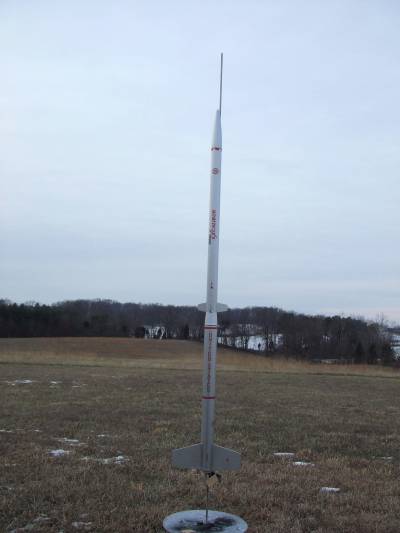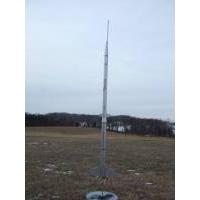| Construction Rating: | starstarstarstarstar |
| Flight Rating: | starstarstarstarstar |
| Overall Rating: | starstarstarstarstar_border |
| Published: | 2011-01-21 |
| Diameter: | 0.91 inches |
| Manufacturer: | Semroc  |
| Skill Level: | 1 |
| Style: | Sport |
 Brief
Brief
This is a retro-repro of the 1972 Centuri model of the same name which was later introduced as a two-stage version called the Excalibur 2. Semroc's version holds close to the original, featuring Centuri-sized tubing, but replaces the plastic nose cone with a balsa one and upgrades the fins to laser-cut precision (fiberboard).
Components
- Balsa nose cone
- Series 7 upper tube
- Balsa transition
- Series 8 lower tube
- Laser-cut fiber fins (3+3)
- 18mm motor tube, metal hook, motor block
- Kevlar+elastic shock cord
- 12" plastic chute
- Waterslide decals
Construction
The instructions for this are very good, well illustrated, and the typical modeler should have no trouble building this within a couple hours plus finishing time. I'd peg it at a skill level 1 kit.
The motor mount is conventional 18mm tube, a centering ring motor block in the forward end, a metal motor hook (serving as shock cord anchor) and pair of centering rings. The lower body tube is marked for fin placement using a template in the instructions, as is the upper body tube. Fins are laser-cut fiberboard, so no sanding or grain-filling, just tack right on with CA or wood glue. The balsa transition is glued into the upper tube. The nose cone can be glued on, or if you're interested in using the upper tube as a tiny payload (it's roughly BT-20 sized), friction fit it.
A single launch lug goes into the fin/tube joint along the aft end of the lower tube, finishing up construction.
Finishing
The fiberboard fins were certainly easy to deal with, and the body tubes had thin enough spirals that I opted to skip filling and just go for heavier primer coats with some sanding in between. I did at least hit the balsa nose cone and transition with a generous smear of diluted wood filler.
I went with a single-color scheme, two coats of gray primer topped with two coats of silver metallic.
There are waterslide decals for trim, very easy to work with.
Flight
I picked a nice day for first flight, freezing temps, but hardly any wind at all. I went for the C6-5 option and was rewarded with a straight up boost, surprisingly quick for such a long rocket (and a bit heavy at 1.45 ounces without motor). Deployment was fairly close to apogee, so the -5 is the right delay. It was pretty overcast, making it tough to see the top of the flight, so I'd estimate an altitude somewhere in the wide range of 600-800 feet. If flying on a smallish ball field, a C could certainly drift a couple hundred yards with typical 5-10 mph winds.
Recovery
No issue with the recovery--the 12" chute does the job, and this landed gently about 40 yards from the pad.
Summary
This is another fine design from Semroc. It's on the lower end of the skill level/complexity curve, a bit more interesting than entry-level starter kits, and flies fine.
 |
 |
Flights
 |
 |
